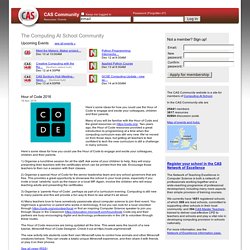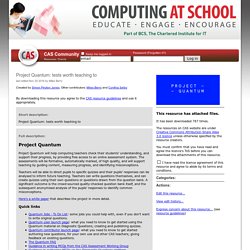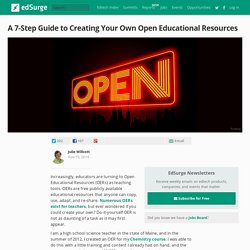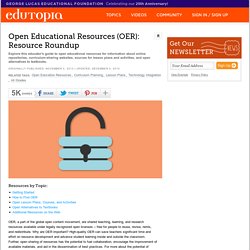

Shaping the future of maths and science education with inGenious - ECB. Home. Door. Here’s some ideas for how you could use the Hour of Code to engage and excite your colleagues, children and their parents.

Many of you will be familiar with the Hour of Code and the great resources on Two years ago, the Hour of Code resources provided a great introduction to programming at a time when the computing curriculum was still very new. We’ve moved on from those days, but getting all teachers to feel confident to tech the new curriculum is still a challenge in many schools. 1) Organise a lunchtime session for all the staff. Ask some of your children to help, they will enjoy presenting their teachers with the certificates which can be printed from the site. Encourage those teachers to then run a session with their classes. 2) Organise a special Hour of Code for the senior leadership team and any school governors that are free. 3) Organise a ‘parents Hour of Code’, perhaps as part of a curriculum evening.
The Hour of Code resources are being updated all the time. Quickstart: Computing for primary. Terms & Resources — Code Club World Projects. Home. Home - Barefoot Computing Barefoot Computing. Computer Science Field Guide - Computer Science Field Guide. BBC Make It Digital. The Micro:bit Foundation is a global non-profit organisation making invention with technology fun for everyone! BBC Schools - Computing. Diagnostic Questions. Project Quantum: tests worth teaching to. Full description: Project Quantum will help computing teachers check their students’ understanding, and support their progress, by providing free access to an online assessment system.

The assessments will be formative, automatically marked, of high quality, and will support teaching by guiding content, measuring progress, and identifying misconceptions. Teachers will be able to direct pupils to specific quizzes and their pupils’ responses can be analysed to inform future teaching. Teachers can write questions themselves, and can create quizzes using their own questions or questions drawn from the question bank. A significant outcome is the crowd-sourced quality-checked question bank itself, and the subsequent anonymised analysis of the pupils’ responses to identify common misconceptions.
Here’s a white paper that describes the project in more detail. Some videos Key features of Quantum Quality is key. The CAS team On the CAS end, our content advisory group consists of Status reports. Teaching London Computing: A RESOURCE HUB from CAS LONDON. HOME. A 7 Step Guide to Creating Your Own Open Educational Resources. Increasingly, educators are turning to Open Educational Resources (OERs) as teaching tools.

OERs are free publicly available educational resources that anyone can copy, use, adapt, and re-share. Numerous OERs exist for teachers, but ever wondered if you could create your own? Do-it-yourself OER is not as daunting of a task as it may first appear. I am a high school science teacher in the state of Maine, and in the summer of 2012, I created an OER for my Chemistry course. I was able to do this with a little training and content I already had on hand, and the course currently has over 111,000 subscribers--and continues to grow. I feel my students have benefitted from this OER content because it specifically addresses their background understanding, is directed at their learning objectives, and can be readily edited to meet emerging needs.
So, how can you get started creating OERs? 1. Once you have decided on a target device(s), you can consider how you want to deliver content. 2. 3. 4. 5. Eduvee. Open Educational Resources (OER): Resource Roundup. Resources by Topic: OER, a part of the global open content movement, are shared teaching, learning, and research resources available under legally recognized open licenses -- free for people to reuse, revise, remix, and redistribute.

Why are OER important? High-quality OER can save teachers significant time and effort on resource development and advance student learning inside and outside the classroom. Further, open sharing of resources has the potential to fuel collaboration, encourage the improvement of available materials, and aid in the dissemination of best practices. For more about the potential of OER, check out "5-Minute Film Festival: Why Open Education Matters," by Edutopia's VideoAmy. Getting Started Sharing Resources The nonprofit Creative Commons offers free, easy-to-use copyright licenses that allow you to specify which rights to your works you want to reserve and which rights you'd like to waive. Quality Considerations With all the promise of OER, some challenges remain.